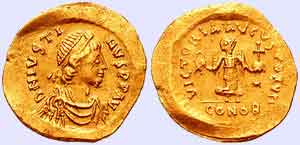|
|
 Flavius Iustinus Augustus. [Source] Flavius Iustinus (c. 450–August 1, 527), known in English as Justin I, was an Eastern Roman Emperor (518 to 527) of the Justinian Dynasty, who rose through the ranks of the army of the Byzantine Empire and ultimately became its emperor, in spite of the fact he was illiterate and almost 70 years old at the time of accession. His reign is significant for the founding of a dynasty that included his eminent nephew Justinian I and laws that de-emphasized the influence of the old Byzantine nobility. Justin was a Romanised Dacian/Thracian peasant[1][2] who was born in a hamlet near Bederiana in the diocese of Dacia Aureliana, which, along with Macedonia made up the Prefecture of Illyricum. As a teenager, Justin and two Thracian companions, Dityvistus and Zimarchus[3] fled from a barbarian invasion, taking refuge in Constantinople. There, Emperor Leo I, himself of Dacian origin, was organizing a new corp of Excubitors, an elite imperial guard, 300 in number, who were intended to counterbalance the Germanic influence at the court. The rugged Justin and his companions soon joined the army, and because of his ability, rose through the ranks to become a general and commander of the palace guard under the Emperor Anastasius I decades later. Thanks to his position (he commanded the only troops in the city) and gifts of money, Justin was able to secure election as emperor in 518. A career soldier with little knowledge of statecraft, Justin wisely surrounded himself with trusted advisors. The most prominent of these men, of course, was his nephew Flavius Petrus Sabbatius, whom he adopted as his son and invested with the name Iustinianus (Justinian). It is common now to say that Justinian ruled the empire in his uncle's name during this time, thanks to the accounts of the historian Procopius, but there is much evidence to the contrary. In fact, Justinian was not named as successor until less than a year before Justin's death. In 525, Justin repealed a law that effectively prohibited a member of the senatorial class from marrying a woman from a lower class of society, including the theatre, which was considered scandalous at the time. This edict paved the way for Justinian to marry Theodora, a former mime actress, and eventually resulted in a major change to the old class distinctions at the Imperial court. The latter years of his reign were marked by strife between the empire and the Ostrogoths and Persians. In 526, Justin's health began to decline and he formally named Justinian as co-emperor and his successor on April 1, 527. On August 1 of that year, Justin died and was succeeded by Justinian. The town of Anazarbus was re-named Justinopolis in 525, in his honour.
Notes
Links
Preceded by Anastasius I Preceded by Flavius Anastasius Paulus Probus Moschianus Probus Magnus, Post consulatum Agapiti (West) Preceded by Flavius Maximus (alone) Retrieved from "http://en.wikipedia.org/"
 |
|
|||||||||||||||||